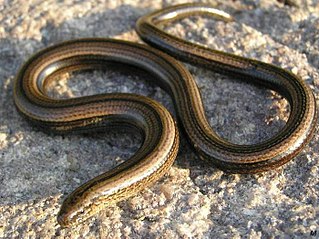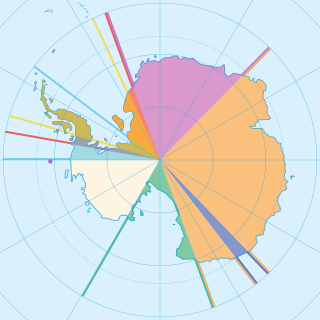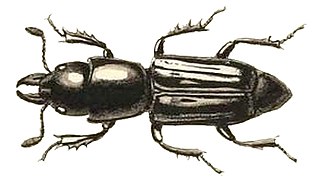
Geranium is a genus of 422 species of annual, biennial, and perennial plants that are commonly known as geraniums or cranesbills. They are found throughout the temperate regions of the world and the mountains of the tropics, but mostly in the eastern part of the Mediterranean region.

A wallaby is a small or middle-sized macropod native to Australia and New Guinea, with introduced populations in New Zealand, Hawaii, the United Kingdom and other countries. They belong to the same taxonomic family as kangaroos and sometimes the same genus, but kangaroos are specifically categorised into the four largest species of the family. The term "wallaby" is an informal designation generally used for any macropod that is smaller than a kangaroo or a wallaroo that has not been designated otherwise.

Anguidae refers to a large and diverse family of lizards native to the Northern Hemisphere. Common characteristics of this group include a reduced supratemporal arch, striations on the medial faces of tooth crowns, osteoderms, and a lateral fold in the skin of most taxa. The group includes the slowworms, glass lizards, and alligator lizards, among others. The family is divided into three subfamilies, and contains about 100 species in 10 genera.

The genus Arctocephalus consists of fur seals. Arctocephalus translates to "bear head."

Colonization of Antarctica refers to having humans, including families, living permanently on the continent of Antarctica. Currently, the continent hosts only a temporary transient population of scientists and support staff. Antarctica is the only continent on Earth without indigenous human inhabitants.
Peter Elzinga was the executive director of the Progressive Conservative Party in Alberta, Canada, a former Member of Parliament in the House of Commons of Canada and former cabinet minister in Alberta.

Eciton is a New World army ant genus that contains the most familiar species of army ants. The most predominant and well-known species is Eciton burchellii, which is also more commonly known as the army ant and is considered the type species.

Syntelia is a genus of middle-sized beetles described by John O. Westwood in 1864. It is the only genus in the family Synteliidae erected by George Lewis in 1882.

The Scalopinae, or New World moles, are one of three subfamilies of the family Talpidae, which consists of moles and mole-like animals; the other two subfamilies being the Old World talpids and the Chinese shrew-like moles (Uropsilinae). The Scalopinae are the only Talpidae subfamily to consist entirely of undisputed moles and no mole-like close relatives such as shrew-moles or desmans. They are found virtually everywhere soil conditions permit in North America, except northern Canada and those areas of northeastern Mexico where the soil is too sandy. There is also one species in China.

BVV Barendrecht is a football club from Barendrecht, Netherlands. The club was founded on 12 February 1926 and plays its matches at Sportpark de Bongerd. With more than 2000 members, Barendrecht is one of the largest amateur clubs of the Netherlands in membership.
Ascidae is a family of mites in the order Mesostigmata.
Rettenmeyerius is a genus of mites in the family Ascidae.
Larvamima is a genus of mites placed in its own family, Larvamimidae, in the order Mesostigmata. Larvamima contains four recognized species:
Circocylliba is a genus of mites in the order Mesostigmata, placed in its own family, Circocyllibamidae.

Uropodidae is a family of mites in the order Mesostigmata.
Antennequesoma is a genus of tortoise mites in the family Uropodidae. There are at least two described species in Antennequesoma.
Coxequesoma is a genus of tortoise mites in the family Uropodidae. There are about five described species in Coxequesoma.
William Breit (1933–2011) was an American economist, mystery novelist, and professional comedian. Breit was born in New Orleans. He received his undergraduate and master's degrees from the University of Texas and his Ph.D from Michigan State University in 1961. He was an Assistant and Associate Professor of Economics at Louisiana State University (1961-1965) On the recommendation of Milton Friedman he was interviewed and hired at the University of Virginia where he was Associate Professor and Professor of Economics (1965-1983). He returned to his San Antonio as the E.M. Stevens Distinguished Professor of Economics at Trinity University in 1983 and retired as the Vernon F. Taylor Distinguished Professor Emeritus in 2002. He is considered an expert in the history of economic thought and anti-trust economics. He established the Nobel Laureate Lecture Series at Trinity University and is most notable as a mystery novelist where their murder mysteries are solved by applying basic economic principles.
Ovivora is a genus in the phylum Apicomplexa.

Arthur (Tuur) Elzinga is a Dutch politician and trade unionist. Between 2007 and 2016 he served in the Senate of the Netherlands representing the Socialist Party. Since 2018, he is a vice-president of the trade union confederation FNV with responsibilities for pensions and international affairs.










